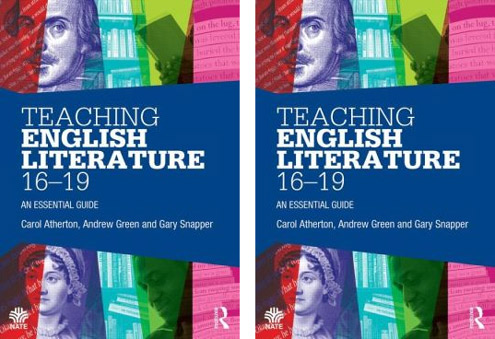
A new title in the NATE/Routledge Teaching English Series
Teaching English Literature 16-19 An Essential Guide
by Carol Atherton, Andrew Green and Gary Snapper
A new piece of work by Andrew Green and Gary Snapper who are both part of the consultancy team here at EnglishEdu.
“… a major step forward in the teaching of English Literature at 16-19 … principled, persuasive, and packed with great teaching ideas … an essential handbook for anyone teaching the subject in the sixth form today…?
Sean McEvoy, Varndean College, Brighton
“ This wide-ranging book, grounded in teachers’ experience, rich in subject knowledge … fills a long-felt need to support teachers of English … outstanding?
Robert Eaglestone, Royal Holloway University of London
Published by Routledge, June 2013, at £24.99. Review copies from www.routledge.com. Available to buy from www.nate.org.uk at a discount of 20%.
Teaching English Literature 16-19 is intended for use both as an introductory guide for those new to teaching literature and as an aid to reflection and renewal for more experienced teachers and teacher trainers. Combining discussion of issues such as the purpose and value of literary study, the nature of knowledge about literature, and debates about the content of the literature curriculum, with practical advice on classroom strategies, this book not only provides a focus for teaching practice but also encourages a debate about what we do as teachers of literature in the sixth form. Teaching English Literature 16-19 seeks to present a vision for contemporary literature teaching which takes into account the many changes which have taken place in the discipline during the 24 years since the last major text on this topic.
Whilst many resources give teachers instructions on how to teach specific syllabuses, this book (suitable for teachers of A Level, the International Baccalaureate and Scottish Highers in the UK, and for advanced literature courses internationally) steps back and examines some of the fundamental principles of teaching literature at this level, whatever the course. Arguing that a literature curriculum is more than the elements of a syllabus, the book contains detailed reflections on teaching poetry, the novel and drama, as well as discussions of the place of theory and criticism in literature teaching, and of the teaching of writing within literature courses.
“This new book represents a major step forward in the teaching of English Literature at 16-19. It puts authentic students’ learning back at the centre of our teaching, and insists on the importance of developing readers and writers in a complex and diverse world where the traditional literary text must take its place alongside so many other powerful cultural products.
At no point do the authors duck the challenges of teaching English Literature in twenty-first century classrooms. It’s principled, persuasive, and packed with great teaching ideas. It’s an essential handbook for anyone teaching the subject in the sixth form today.?
Sean McEvoy, International Baccalaureate Co-ordinator. Varndean Sixth Form College, Brighton, author of Shakespeare: the Basics (Routledge)
“English is one of the most controversial and quickly changing subjects in education. The shifting 16-19 curriculum, rapidly developing subject knowledge, innovative forms of literary interpretation and theory, and even pedagogy, are in flux. This wide-ranging book, grounded in teachers’ hands-on experience, rich in subject knowledge, written in a down-to-earth way, fills a long-felt need to support teachers of English.
Written by a ‘dream team’ of people involved in the 16-19 curriculum, from a clear, well-informed and sensible viewpoint, this outstanding book offers resources for teachers of English literature and English language. It will also assist with the ‘stretch and challenge’ agenda, help students develop independent learning, and bridge the gap between secondary education and university study.?
Robert Eaglestone, Professor of Contemporary Literature and Thought. Royal Holloway, University of London, author of Doing English (Routledge)